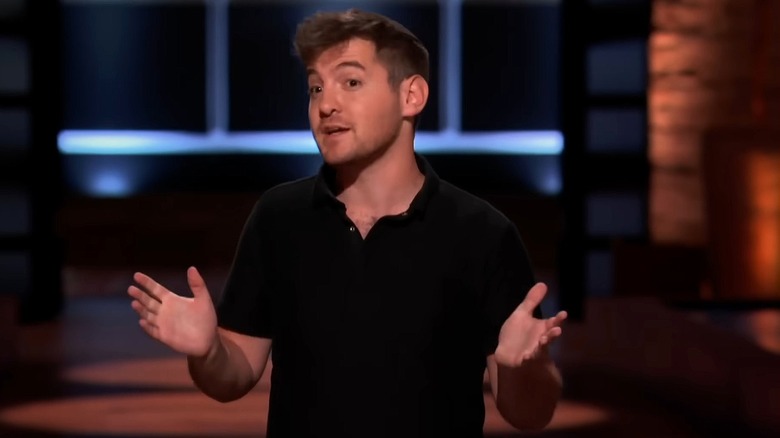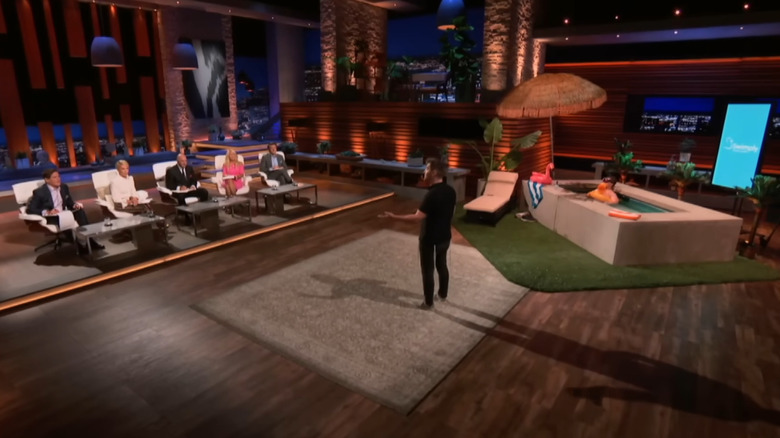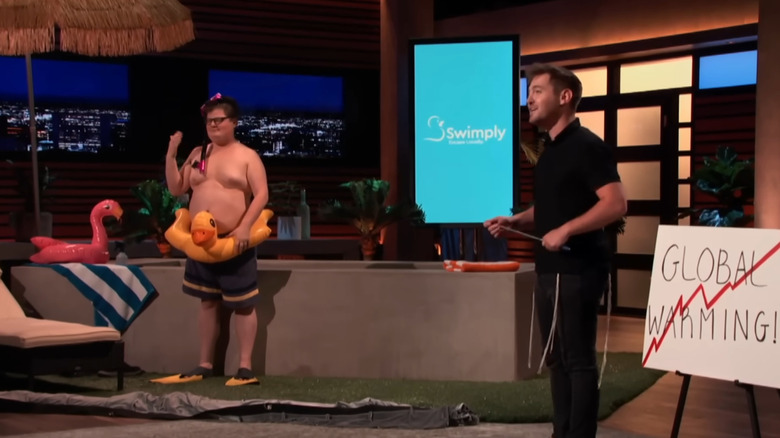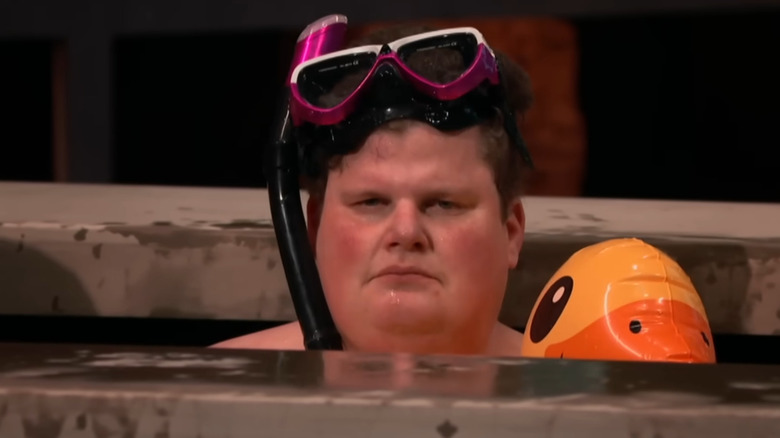What Happened To The Swimply App From Shark Tank Season 11?
Having a backyard pool is a dream for countless individuals, and one that is often far out of reach. Public pools are an option to get your swim in, but chances are that tons of other families will be occupying the space as well. For average people seeking a personalized pool experience, the "Shark Tank" debut of Swimply is sure to be a refreshing revelation.
The service operates in a similar manner to that of Airbinb, where owners can list their pools and have customers rent them out on an hourly rate. As participants enjoy the exclusivity, pool owners earn passive income and recoup on maintenance fees. This was the spark that led founder Bunim Laskin to launch the company. Seeking ways to entertain his 11 siblings one summer, he learned that their neighbor owned a pool that hardly got used. In return for his family using the pool, he offered to pay for a portion of the expenses. The entire neighborhood was soon paying to use the pool, inspiring Laskin to start a business around a similar idea. Laskin officially started Swimply in July 2019 and within two weeks the app received over 15,000 downloads.
The company featured on Season 11 of "Shark Tank," the same season that included notable pitches such as the math tutor robot ABii and custom-built camper vans from Boho. Laskin enthusiastically touted the built-in value of Swimply's concept. But his fast-talking nature did little to hide some of the faultier aspects of his business that resulted in no sharks getting involved. However, a unique set of circumstances helped Swimply kick into high gear in the show's aftermath.
What happened to Swimply on Shark Tank?
Bunim Laskin came into the tank with a big ask — $300,000 in return for 5% equity, equating to a $6 million valuation. He began his presentation on a comedic touch, jokingly implying that Swimply could aid in stopping global warming before unveiling a friend in swim gear demonstrating the app by humorously wading in a display pool. To start up the business, he invested $40,000, most of which went into hiring a web developer to make an early version website.
He then used this early version to raise an additional $960,000 at a $6 million valuation from a pool maintenance sponsor, which further allowed the team to refine their site. The business model allowed owners to set the hourly charge, put in limits, and added fees for inclusions such as extra guests. From there, the company takes 25% of the final charge. At this point, Swimply had brought in $215,000 in revenue with $42,000 in net profits.
While Laskin viewed his valuation as being reasonable in a long-term sense, the Sharks failed to connect the dots. Lori Greiner recognized the need but didn't feel it was a valuable enough investment, Barbara Corcoran didn't understand the concept, and Kevin O'Leary found the valuation ridiculous. Mark Cuban felt that Laskin lacked self-awareness, and Robert Herjavec was barely able to get a word in before dropping out due to the entrepreneur's rapid-fire manner of talking.
Swimply after Shark Tank
Just because the Sharks failed to see the value in Swimply didn't mean that its hot-headed founder was ready to give up hope. And as it turned out, a strange bit of timing helped give Swimply an unexpected boost in the midst of a particularly chaotic time in recent history, in large part thanks to "Shark Tank."
The Swimply "Shark Tank" segment aired on March 13, 2020 — right at the time when the COVID-19 pandemic hit the world like a ton of bricks. While this proved to be a detriment to countless businesses, Swimply found itself at a surprising advantage due to CDC reports at the time stating that chlorine-treated pools could aid in inactivating the virus. Many soon gravitated to swimming pools as one of the few places for social interactions during the pandemic, resulting in a 4,000% rate of growth for Swimply. With the newfound boost in revenue, the company was able to get more investors on board.
In May 2021, Swimply shared that it had closed a Series A funding round of $10 million, with involvement with names attached to major brands such as Airbnb, Ancestry.com, and Poshmark. The company experienced other boosts in the following years, including being situated in hundreds of cities within the U.S., Canada, and Australia, bringing in $25 million in revenue in 2023, and expanding to include sport court reservations. In 2023, founder Bunim Laskin was placed on Forbes prestigious 30 Under 30 list in the Consumer Technology category.
Is Swimply still in business?
Today, Swimply is not only surviving but thriving. While it has yet to become a household name on the same level as Airbnb, the efforts put into the company have certainly paid off with an ever-growing customer base. The service can be accessed either online through the Swimply website or on the free app available on both the iOS App Store and Google Play.
Users can type in their location and preferred date to find pools in their area. The search can be further filtered to include price ranges, pool types, and specific amenities such as restroom access, children and pet policies, parking availability, and the inclusion of outdoor media among others. Each selection provides information about the hourly rate, limitations put in place by the hosts, and reviews from previous renters. Along with pools, users can also find various sport courts, interior spaces, pet parks, and even photo studios to rent out through the service.
Those who want to host using their space can also sign up through the site and create listings for free. However, Swimply does not provide a full-on liability insurance policy, rather giving hosts a guarantee that offers $1 million worth of protection in the case of a lawsuit and a $10,000 for property damage. Owners are also required to have their pools properly inspected and maintenance to meet safety standards.
What's next for Swimply?
Even with a bevy of locations and millions in revenue, the team believe that Swimply is destined for greater things in its future. A May 2025 report projected that 2 million people would be using the service due to predictions of the 2025 summer being the hottest on record. However, the team recognize that it will take more than some hot weather to encourage brand loyalty.
In an interview on The Future of Consumer Marketing podcast, Swimply founder Bunim Laskin felt that the biggest hurdle to overcome was getting newcomers onboard. "Right now it's mainly our goal is to demystify Swimply," he shared. "Our goal to get exponentially larger is to just make this less frickin' weird and no amount of ads or selling will do that and so our goal is really to crack the code of breaking into the culture and trying to shift the culture around Swimply..." Along with employing traditional marketing methods such as influencer collaborations and press releases, the company has been exploring less-traditional avenues to new customers into the experience.
Among these are special LA-based live events made in partnership with major entertainment brands and franchises such as "Star Wars," "Moana," and "Harry Potter." Laskin is confident in this method, adding, "Now with these upcoming experiences that we're going to launch — that are just going to be out of this world — you just create really magical moments that get people to talk about it ... and they'll associate you less with stranger danger and more with serenity, peace, and maybe even Star Wars."




